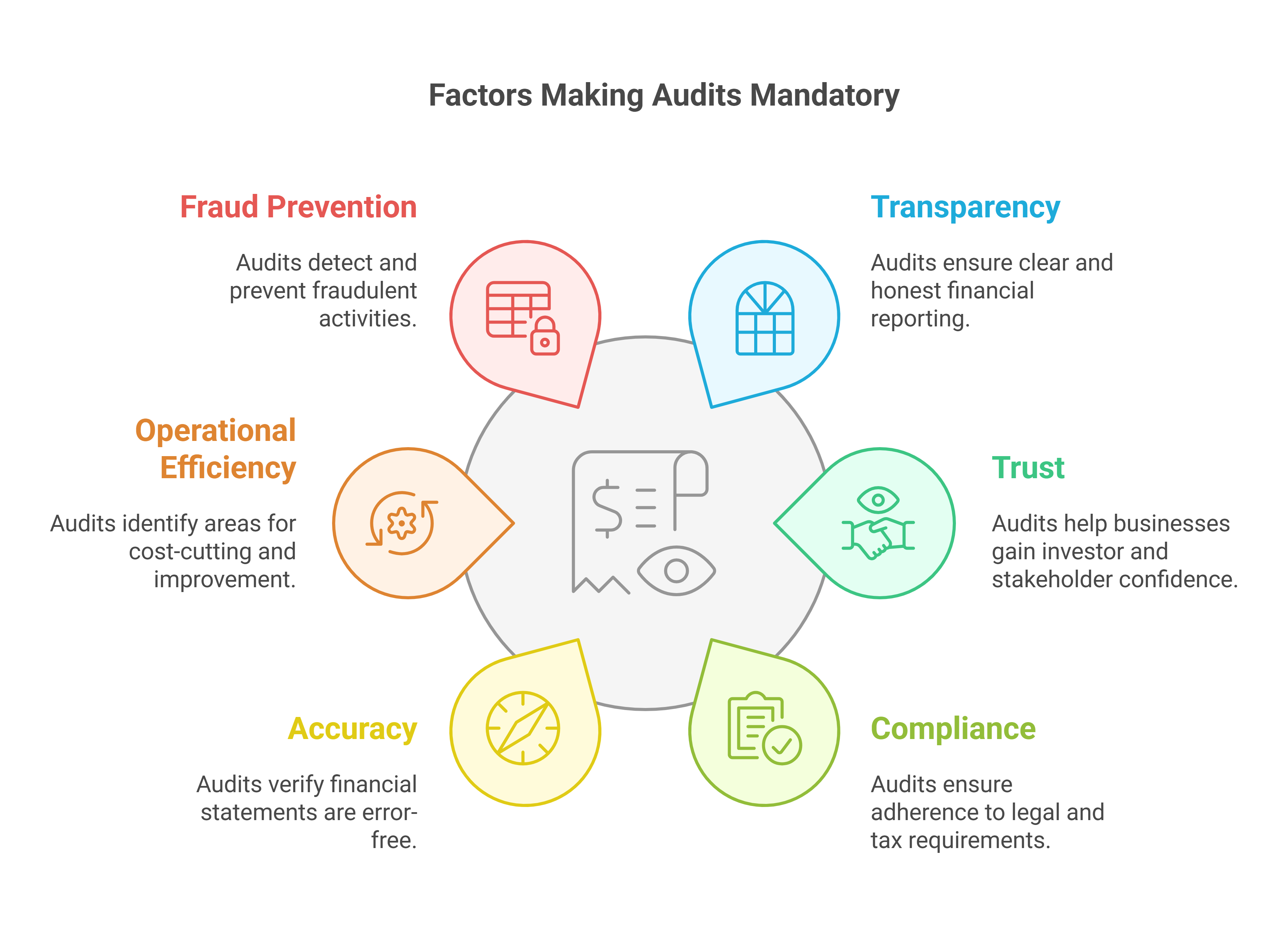For the successful operations of businesses in the UAE, an audit must be conducted. This is why it is important to understand the audit requirements in UAE. To keep a precise check on the financial position of any business, an audit is mandatory. It declares the financial health of your business while ensuring compliance with the legal regulations of the UAE government.
Whether it’s a freshly started startup or a large-scale organization. Whether you’re a new startup or an established company, knowing the auditing rules and regulations will help you avoid penalties. This way, your business will stay on the right track.
Explore this information guide equipped with the complete breakdown of UAE audit requirements in 2026. Understand the legal requirements, the entire process, and the benefits that come along. Also, find answers to the common queries below.
What Is an Audit?
Understand the basic concept of audit before indulging in audit requirements in UAE. An audit refers to the company’s financial examination including proper reports and accurate records. Dissen shares of the business operations are legally aligned. Audits determine the accuracy of the financial statement of the company.
The external and internal audits are the different types of audits. The common type is an external audit. It is carried out by an independent third party and is required by law.
Stay Compliant with UAE Laws by Meeting Every Audit Requirement
Why are Audits Important for Businesses in UAE?

Audit has become an integral part of business operations. Not only brings transparency and finances but also businesses to gain the trust of investors. The government authorities and stakeholders also find it easier to work with such businesses. Below factors are making audits mandatory:
Compliance: Ensuring your business adheres to the UAE’s legal and tax requirements.
Accuracy: Verifying that your financial statements are accurate and free of errors.
Transparency: Clear financial reports help in being reliable for investors, banks, and customers.
Operational Efficiency: Identifying areas for cost-cutting, better management, and improved operations.
Prevention of Fraud: It detects any fraudulent activity that is being done within your business or is expected.
Legal Audit Requirements for Businesses in the UAE
The UAE has determined certain audit requirements. Every business is required to follow these regulations and ensure that the financial reporting is done correctly. The key legal factors of audit requirements in the UAE are determined below.
Who Needs to Be Audited?
The UAE has made it mandatory to undergo an audit for certain types of businesses. As a general rule:
- LLCs or Limited Liability Companies – All LLCs must have their financial statements audited. This excludes those that are wholly owned by the UAE government or located in free zones that are exempted from the requirement.
- Public Joint Stock Companies or PJSC: They must have their financial records audited by law.
- Foreign Companies: Foreign companies operating in the UAE are also required to comply with audit requirements.
- Free Zone Companies: Depending on the type of free zone, some companies may be exempt from audit requirements. However, many free zones still require annual audits.
Audit Report Submission Timeline
The audit requirements in UAE include timely submission of financial reports. The audit findings must follow the specific guideline. Generally, companies are entitled to hand over their audit reports within three months once their financial year ends. However, this timeline is different for different legal structures of businesses.
Choosing an Auditor in UAE
For the efficient audit conduct, businesses are required to select an auditor. Make sure they possess the license. The UAE imposes strict regulations of only choosing registered auditors. They must be registered with the UAE’s Ministry of Economy or the relevant Free Zone Authority.
The Role of the Auditor
Auditors review your company’s financial record. It is their prime duty to examine accounting systems. They also make sure that your business operation meets legal expectations. They determine financial health by providing detailed and updated reports. The report entails the truth and justifications behind the financial statements.
Need Clarity on Which Audit Rules Apply to Your Business?
Common Audit Requirements in UAE
Businesses in the UAE must adhere to various audit requirements to ensure compliance with both local and international accounting standards. Below are the common requirements that companies must meet:
Financial Statement Preparation
All businesses must prepare financial statements as per Financial Reporting Standards (UAE FRS). This includes:
- Balance Sheet which is a snapshot of the company’s assets, liabilities, and equity.
- Profit and Loss Statement, determining the company’s revenues and expenses.
- Cash Flow Statement which is a summary of the company’s inflows and outflows of cash.
- Statement of Changes in Equity throughout the year.
Compliance with International Standards
Those businesses that are operating globally are required to follow the International Financial Reporting Standards IFRS. Those having international investors are also required to fulfill this step.
Tax Compliance
Businesses must ensure that their taxes are calculated and reported correctly. This includes Value Added Tax. The UAE has strict tax laws, and an audit helps with text obligations.
How to Prepare for an Audit in UAE
Prepare the financial records of your company in advance to make the audit smooth. Here is an effective checklist to keep you ready timely:
- Maintain accurate financial records with updated receipts, invoices, and bank statements.
- Double-check the financial operations of your business if they are following the tax laws.
- Keeping an auditor throughout the journey will help your financial records stay in order from time to time.
- Make sure all the previous financial statements are accurate. They must appear authentic to the relevant authorities.
Benefits of Conducting Regular Audits
Regular audits bring a lot of convenience. Here are a few advantages to notice for businesses in the UAE.
- Improved Financial Management
Audits can help identify financial inefficiencies, allowing you to optimize cash flow and reduce costs.
- Enhanced Reputation
Regular audits demonstrate to stakeholders that your business is transparent and trustworthy.
- Better Tax Planning
Audits help ensure that your business is paying the correct amount of taxes, preventing costly penalties.
- Risk Management
Audits can uncover potential risks, such as fraud or poor financial management, which can be mitigated before they become bigger issues.
Audit Requirements in UAE: Key Points at a Glance
To simplify the audit requirements in UAE, here’s a quick reference table summarizing the key points:
| Requirement | Details |
| Businesses That Need an Audit | LLCs, Public Joint Stock Companies, Foreign Companies, Some Free Zone Companies |
| Audit Report Deadline | Within three months after the end of the company’s financial year |
| Required Documents | Financial statements, tax records, bank statements, and all relevant financial documents |
| Audit Types | External audit by an independent, licensed auditor |
| Applicable Regulations | UAE Financial Reporting Standards (UAE FRS) and International Financial Reporting Standards (IFRS) |
| Tax Compliance | Ensure VAT and other tax obligations are properly calculated and reported |
Conclusion
Being a businessman it is essential to understand the audit requirements in UAE. Also, it is important to make sure that your business remains legally approved while having financial transparency to display. Set your business for continued progress by fully meeting the mentioned requirements and selecting a qualified auditor. Don’t forget to prepare your financial documents properly.
Audit orders can be difficult at times but come with several incentives. This leads to better financial management and enables businesses to stand distinguished with good reputation in the market. It serves more than just a regulatory obligation. With the growing competition, it has become a vital tool that helps your business to grow in the UAE.
Save Time and Reduce Errors with Expert Audit Assistance
FAQs
Is an Audit Compulsory in The UAE?
Yes. Audits are compulsory for LLCs, Public Joint Stock Companies, and foreign companies. Many free zone companies also require audits depending on the zone’s rules. Regular audits ensure compliance, transparency, and financial accuracy for businesses.
What Is the Threshold Limit for Audit in The UAE?
There’s no specific financial threshold. Instead, the requirement depends on the company type. LLCs, PJSCs, and foreign companies must undergo annual audits, while some free zones may exempt smaller businesses based on their internal regulations.
What Are the Minimum Requirements for An Audit?
Companies must prepare complete financial statements (balance sheet, profit and loss, cash flow, and equity changes) as per UAE FRS or IFRS. Licensed, registered auditors must review them, and reports must usually be submitted within three months of the financial year’s end.
Is an Audit Required for Corporate Tax in The UAE?
Across the UAE, audits help in accurate tax reporting. This may include VAT and corporate tax. They prevent errors, detect fraud, and keep businesses compliant with tax laws. An audited financial statement supports correct tax filings. It helps avoid fines and penalties.
Is an Audit Mandatory for Free Zone Companies in The UAE?
Doing an audit depends on the free zone. Some zones exempt companies from audits. However, many require annual audits for license renewal and compliance. It is advisable to always check your specific free zone’s rules so that you can avoid penalties or delays in license renewals.




